This brochure provides information about the qualifications and business practices of 7300 Wealth Management, LLC. If you have any questions about the contents of this brochure, please contact us at (719) 358-6674 or by email at: cjc@7300wealth.com. The information in this brochure has not been approved or verified by the United States Securities and Exchange Commission or by any state securities authority.
Additional information about 7300 Wealth Management, LLC. is also available on the SEC’s website at www.adviserinfo.sec.gov. 7300 Wealth Management, LLC.’s CRD number is: 169536
Registration does not imply a certain level of skill or training.
Version Date: 05/17/2023
Item 2: Material /Changes
The material changes in this brochure from the last annual updating amendment of 7300 Wealth. Management, LLC on March 16, 2022, are described below. Material changes relate to 7300 Wealth. Management, LLC’s policies, practices or conflicts of interests.
- 7300 Wealth Management, LLC has added pension consulting services and fees. (Items 4 and 5)
- 7300 Wealth Management, LLC has added management fees plan sponsors and their participants in employee retirement plans. (Item 5)
Item 3: Table of Contents
Form ADV Part 2A
Item 2: Material /Changes………………………………………………………………………………………………………………………………………………………………….. i
Item 3: Table of Contents …………………………………………………………………………………………………………………………………………………………………… ii
Item 4: Advisory Business …………………………………………………………………………………………………………………………………………………………………..3
Item 5: Fees and Compensation…………………………………………………………………………………………………………………………………………………………..5
Item 6: Performance-Based Fees and Side-By-Side Management …………………………………………………………………………………………………………6
Item 7: Types of Clients ………………………………………………………………………………………………………………………………………………………………………6
Item 8: Methods of Analysis, Investment Strategies, and Risk of Investment Loss ……………………………………………………………………………….7
Item 9: Disciplinary Information ……………………………………………………………………………………………………………………………………………………….10
Item 10: Other Financial Industry Activities and Affiliations……………………………………………………………………………………………………………..10
Item 11: Code of Ethics, Participation or Interest in Client Transactions and Personal Trading…………………………………………………………..11
Item 12: Brokerage Practices………………………………………………………………………………………………………………………………………………………………12
Item 13: Reviews of Accounts ……………………………………………………………………………………………………………………………………………………………13
Item 14: Client Referrals and Other Compensation ……………………………………………………………………………………………………………………………13
Item 15: Custody……………………………………………………………………………………………………………………………………………………………………………….13
Item 16: Investment Discretion ………………………………………………………………………………………………………………………………………………………….13
Item 17: Voting Client Securities (Proxy Voting)………………………………………………………………………………………………………………………………..14
Item 18: Financial Information…………………………………………………………………………………………………………………………………………………………..14
Item 19: Requirements For State Registered Advisers ………………………………………………………………………………………………………………………..14
Item 2: Educational Background and Business Experience…………………………………………………………………………………………………………………17
Item 3: Disciplinary Information ……………………………………………………………………………………………………………………………………………………….17
Item 4: Other Business Activities……………………………………………………………………………………………………………………………………………………….17
Item 5: Additional Compensation ……………………………………………………………………………………………………………………………………………………..18
Item 6: Supervision……………………………………………………………………………………………………………………………………………………………………………18
Item 7: Requirements For State Registered Advisers………………………………………………………………………………………………………………………….18
Item 4: Advisory Business
7300 Wealth Management, LLC. (hereinafter “7300”) is a Limited Liability Company organized in the State of Colorado. The firm was formed in September 2013, and the principal owner is Christopher Joel Carroll.
7300 offers the following services to advisory clients:
Portfolio Management Services
7300 offers ongoing portfolio management services based on the individual goals, objectives, time horizon, and risk tolerance of each client. 7300 creates an Investment Policy Statement for each client, which outlines the client’s current situation (income, tax levels, and risk tolerance levels).
Portfolio management services include, but are not limited to, the following:
• Investment strategy
• Personal investment policy
• Asset allocation
• Asset selection
• Risk tolerance
• Regular portfolio monitoring
7300 evaluates the current investments of each client with respect to their risk tolerance levels and time horizon. Risk tolerance levels are documented in the Investment Policy Statement, which is given to each client.
7300 seeks to provide that investment decisions are made in accordance with the fiduciary duties owed to its accounts and without consideration of 7300’s economic, investment or other financial interests. To meet its fiduciary obligations, 7300 attempts to avoid, among other things, investment or trading practices that systematically advantage or disadvantage certain client portfolios, and, accordingly, 7300’s policy is to seek fair and equitable allocation of investment opportunities/transactions among its clients to avoid favoring one client over another over time. It is 7300’s policy to allocate investment opportunities and transactions it identifies as being appropriate and prudent, including initial public offerings (“IPOs”) and other investment opportunities that might have a limited supply, among its clients on a fair and equitable basis over time. Specifically, 7300 offers the following investment approaches:
Opportunistic Managed Account
7300 offers clients an internally managed Opportunistic Managed Account, which will be a non-benchmarked, all-capitalization, globally managed, basket of individual equities and ETFs exclusively for larger clients. 7300 considers clients with more than $100k to invest in this strategy as large clients. The primary objective is capital appreciation with a secondary objective of high current income. This strategy typically holds between 20-40 securities and aims to provide investors with upside participation in equity markets while potentially limiting downside exposure. Theories such as behavioral finance are regularly employed in this strategy as well as technical and fundamental analysis, market timing, sector rotation, tactical asset allocation, and strategic asset allocation. Typically a minimum of $100,000 is required for inclusion in this strategy. The strategy can carry a high percentage in cash (in excess of 10% but limited to 20%) to attempt to take advantage of the inherent volatility in these underlying vehicles. This strategy should make fewer than 40 trades per year. All potential clients should be aware that leverage involves substantial risk of loss of principal and there are no guarantees that this strategy will meet its intended investment objective.
Financial Planning
Financial plans and financial planning may include, but are not limited to: investment planning; life insurance; tax concerns; retirement planning; college planning; and debt/credit planning.
Pension Consulting Services
7300 offers consulting services to pension or other employee benefit plans (including but not limited to 401(k) plans). Pension consulting may include, but is not limited to:
- identifying investment objectives and restrictions
- providing guidance on various assets classes and investment options
- recommending money managers to manage plan assets in ways designed to achieve objectives
- monitoring performance of money managers and investment options and making recommendations for changes
- recommending other service providers, such as custodians, administrators and brokerdealers
- creating a written pension consulting plan
These services are based on the goals, objectives, demographics, time horizon, and/or risk tolerance of the plan and its participants.
Written Acknowledgement of Fiduciary Status
When we provide investment advice to you regarding your retirement plan account or individual retirement account, we are fiduciaries within the meaning of Title I of the Employee Retirement Income Security Act and/or the Internal Revenue Code, as applicable, which are laws governing retirement accounts. The way we make money creates some conflicts with your interests, so we operate under a special rule that requires us to act in your best interest and not put our interest ahead of yours. Under this special rule’s provisions, we must:
- Meet a professional standard of care when making investment recommendations (give prudent advice);
- Never put our financial interests ahead of yours when making recommendations (give loyal advice);
- Avoid misleading statements about conflicts of interest, fees, and investments;
- Follow policies and procedures designed to ensure that we give advice that is in your best interest;
- Charge no more than is reasonable for our services; and
- Give you basic information about conflicts of interest.
Services Limited to Specific Types of Investments
7300 generally limits its investment advice to mutual funds, equities, fixed income securities, ETFs (including ETFs in the gold and precious metal sectors), real estate funds (including REITs), non-U.S. securities, hedge funds, private equity funds, venture capital funds, insurance products including annuities and private placements, although 7300 primarily recommends Capital Appreciation via tactical allocation using primarily ETFs and equities. 7300 may use other securities as well to help diversify a portfolio when applicable.
7300 offers the same suite of services to all of its clients. However, specific client investment strategies and their implementation are dependent upon the client Investment Policy Statement which outlines each client’s current situation (income, tax levels, and risk tolerance levels). Clients may impose restrictions in investing in certain securities or types of securities in accordance with their values or beliefs. However, if the restrictions prevent 7300 from properly servicing the client account, or if the restrictions would require 7300 to deviate from its standard suite of services, 7300 reserves the right to end the relationship.
A wrap fee program is an investment program where the investor pays one stated fee that includes management fees, transaction costs, fund expenses, and any other administrative fees. 7300 does not participate in any wrap fee programs.
7300 has the following assets under management:

Item 5: Fees and Compensation
Portfolio Management Services Fees
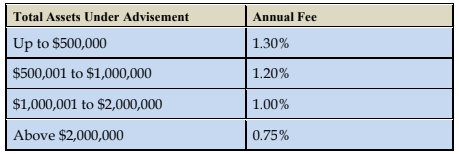
These fees are negotiable and the final fee schedule is attached as Exhibit II of the Investment Advisory Contract. An example of negotiable fee would be if someone came in with $1million, 7300 could bill them standard 1.3pct of first $500k and 1.2pct on next $500k or if they asked for 1.1% on whole amount, rather than lose the business, 7300 would negotiate that deal.
Clients may terminate the agreement without penalty, for full refund of 7300’s fees, within five business days of signing the Investment Advisory Contract. Thereafter, clients may terminate the Investment Advisory Contract with thirty days’ written notice.
7300 uses the account balance at the end of the billing period for purposes of determining the market value of the assets upon which the advisory fee is based.
Portfolio management fees are withdrawn directly from the client’s accounts with client’s written authorization or may be invoiced and billed directly to the client; clients may select the method in which they are billed. Fees are paid quarterly in arrears.
Plan Sponsors and their participants in employee retirement plans that engage 7300 to manage those assets will typically be charged an annual asset management fee of 0.25% per year on all assets managed, billed quarterly in arrears. An average of the daily balance in each account throughout the billing period is used to determine the market value of the assets upon which the advisory fee is based. Fees are withdrawn directly from all accounts with client’s written authorization by the respective custodian. Occasionally, 7300 will receive a request from a Plan Sponsor wanting to be billed via a flat-fee arrangement vs. asset-based compensation method. 7300 will participate in these types of compensation arrangements as well. The method of compensation will always be in arrears.
Financial Planning Fees
Clients may terminate the agreement without penalty, for full refund of 7300’s fees, within five business days of signing the Financial Planning Agreement. Thereafter, clients may terminate the Financial Planning Agreement with upon written notice.
Fixed Fees
The rate for creating client financial plans is between $1,000 and $10,000. The fees are negotiable and the final fee schedule will be attached as Exhibit II of the Financial Planning Agreement. An example of someone getting a negotiated fee would be if someone came in with $2 million in investable assets, 7300 would not charge them the 1.3% on the first $500k, 1.2% on the next $500k. Rather 7300 would give them about a 90 basis point flat fee or around there.
Hourly Fees
The hourly fee for these services is $200. The fees are NOT negotiable and the final fee schedule will be attached as Exhibit II of the Financial Planning Agreement.
Fixed or Hourly Financial Planning fees are paid via check in arrears.
Pension Consulting Services Fees
The rate for pension consulting services is 0.24% of the plan assets for which 7300 is providing such consulting services. These fees are negotiable. Fees will be directly billed to the Plan Sponsor and are paid quarterly in arrears.
Clients are responsible for the payment of all third party fees (i.e. custodian fees, brokerage fees, mutual fund fees, transaction fees, etc.). Those fees are separate and distinct from the fees and expenses charged by 7300. Please see Item 12 of this brochure regarding broker/custodian.
7300 collects its fees in arrears. It does not collect fees in advance.
Neither 7300 nor its supervised persons accept any compensation for the sale of securities or other investment products, including asset-based sales charges or service fees from the sale of mutual funds.
Item 6: Performance-Based Fees and Side-By-Side Management
7300 does not accept performance-based fees or other fees based on a share of capital gains on or capital appreciation of the assets of a client.
Item 7: Types of Clients
7300 Wealth provides investment advisory and financial planning services to Mass-Affluent Individuals, High-Net-Worth Individuals and company sponsored retirement plans, such as 401(k) plans. In addition, 7300 Wealth provides customized financial planning services to some plan participants within these plans.
Minimum Account Size
For the Opportunistic Managed Account, there is an account minimum of $100,000, which may be waived by the investment advisor, based on the needs of the client and the complexity of the situation. This is the only strategy with an account minimum.
Item 8: Methods of Analysis, Investment Strategies, and Risk of Investment Loss
Methods of Analysis
7300’s methods of analysis include charting analysis, fundamental analysis, technical analysis, cyclical analysis, quantitative analysis and modern portfolio theory.
Charting analysis involves the use of patterns in performance charts. 7300 uses this technique to search for patterns used to help predict favorable conditions for buying and/or selling a security.
Fundamental analysis involves the analysis of financial statements, the general financial health of companies, and/or the analysis of management or competitive advantages.
Technical analysis involves the analysis of past market data; primarily price and volume.
Cyclical analysis involved the analysis of business cycles to find favorable conditions for buying and/or selling a security.
Quantitative analysis deals with measurable factors as distinguished from qualitative considerations such as the character of management or the state of employee morale, such as the value of assets, the cost of capital, historical projections of sales, and so on.
Modern portfolio theory is a theory of investment which attempts to maximize portfolio expected return for a given amount of portfolio risk, or equivalently minimize risk for a given level of expected return, by carefully choosing the proportions of various assets.
Investment Strategies
7300 uses long term trading, short term trading, short sales.
Investing in securities involves a risk of loss that you, as a client, should be prepared to bear.
Risks of Methods of Analysis
Charting analysis strategy involves using and comparing various charts to predict long and short term performance or market trends. The risk involved in using this method is that only past performance data is considered without using other methods to crosscheck data. Using charting analysis without other methods of analysis would be making the assumption that past performance will be indicative of future performance. This may not be the case.
Fundamental analysis concentrates on factors that determine a company’s value and expected future earnings. This strategy would normally encourage equity purchases in stocks that are undervalued or priced below their perceived value. The risk assumed is that the market will fail to reach expectations of perceived value.
Technical analysis attempts to predict a future stock price or direction based on market trends. The assumption is that the market follows discernible patterns and if these patterns can be identified then a prediction can be made. The risk is that markets do not always follow patterns and relying solely on this method may not work long term.
Cyclical analysis assumes that the markets react in cyclical patterns which, once identified, can be leveraged to provide performance. The risks with this strategy are two-fold: 1) the markets do not always repeat cyclical patterns and 2) if too many investors begin to implement this strategy, it changes the very cycles these investors are trying to exploit.
Quantitative Model Risk. Investment strategies using quantitative models may perform differently than expected as a result of, among other things, the factors used in the models, the weight placed on each factor, changes from the factors’ historical trends, and technical issues in the construction and implementation of the models.
Modern Portfolio Theory assumes that investors are risk adverse, meaning that given two portfolios that offer the same expected return, investors will prefer the less risky one. Thus, an investor will take on increased risk only if compensated by higher expected returns. Conversely, an investor who wants higher expected returns must accept more risk. The exact trade-off will be the same for all investors, but different investors will evaluate the trade-off differently based on individual risk aversion characteristics. The implication is that a rational investor will not invest in a portfolio if a second portfolio exists with a more favorable risk-expected return profile – i.e., if for that level of risk an alternative portfolio exists which has better expected returns.
Risks of Investment Strategies
7300’s use of short term trading and short sales generally holds greater risk and clients should be aware that there is a material risk of loss using any of those strategies.
Long term trading is designed to capture market rates of both return and risk. Due to its nature, the long-term investment strategy can expose clients to various types of risk that will typically surface at various intervals during the time the client owns the investments. These risks include but are not limited to inflation (purchasing power) risk, interest rate risk, economic risk, market risk, and political/regulatory risk. Short term trading risks include liquidity, economic stability and inflation, in addition to the long term trading risks listed above. Frequent trading, can affect investment performance, particularly through increased brokerage and other transaction costs and taxes.
Short sales entail the possibility of infinite loss. An increase in the applicable securities’ prices will result in a loss and, over time, the market has historically trended upward.
Investing in securities involves a risk of loss that you, as a client, should be prepared to bear.
7300’s use of short sales and short term trading generally holds greater risk of capital loss. Clients should be aware that there is a material risk of loss using any investment strategy. The investment types listed below (leaving aside Treasury Inflation Protected/Inflation Linked Bonds) are not guaranteed or insured by the FDIC or any other government agency.
Mutual Funds: Investing in mutual funds carries the risk of capital loss and thus you may lose money investing in mutual funds. All mutual funds have costs that lower investment returns. They can be of bond “fixed income” nature (lower risk) or stock “equity” nature (mentioned below).
Equity investment generally refers to buying shares of stocks in return for receiving a future payment of dividends and capital gains if the value of the stock increases. The value of equity securities may fluctuate in response to specific situations for each company, industry market conditions and general economic environments.
Fixed income investments generally pay a return on a fixed schedule, though the amount of the payments can vary and include corporate and government debt securities, leveraged loans, high yield, and investment grade debt and structured products, such as mortgage and other asset-backed securities, although individual bonds may be the best known type of fixed income security. In general the fixed income market is volatile, and fixed income securities carry interest rate risk. (As interest rates rise, bond prices usually fall, and vice versa. This effect is usually more pronounced for longer-term securities.) Fixed income securities also carry inflation risk, liquidity risk, call risk and credit and default risks for both issuers and counterparties. The risk of default on treasury inflation protected/inflation linked bonds is dependent upon the U.S. Treasury defaulting (extremely unlikely); however, they carry a potential risk of losing share price value, albeit rather minimal. Risks of investing in foreign fixed income securities also include the general risk of non-U.S. investing described below.
Exchange Traded Funds (ETFs): An ETF is an investment fund traded on stock exchanges, similar to stocks. Investing in ETFs carries the risk of capital loss (sometimes up to a 100% loss in the case of a stock holding bankruptcy). Areas of concern include the lack of transparency in products and increasing complexity, conflicts of interest, and the possibility of inadequate regulatory compliance. Precious Metal ETFs (e.g., Gold, Silver, or Palladium Bullion backed “electronic shares” not physical metal) specifically may be negatively impacted by several unique factors, among them (1) large sales by the official sector which own a significant portion of aggregate world holdings in gold and other precious metals, (2) a significant increase in hedging activities by producers of gold or other precious metals, (3) a significant change in the attitude of speculators and investors.
Real Estate funds (including REITs) face several kinds of risk that are inherent in the real estate sector, which historically has experienced significant fluctuations and cycles in performance. Revenues and cash flows may be adversely affected by: changes in local real estate market conditions due to changes in national or local economic conditions or changes in local property market characteristics; competition from other properties offering the same or similar services; changes in interest rates and in the state of the debt and equity credit markets; the ongoing need for capital improvements; changes in real estate tax rates and other operating expenses; adverse changes in governmental rules and fiscal policies; adverse changes in zoning laws; the impact of present or future environmental legislation and compliance with environmental laws.
Hedge Funds often engage in leveraging and other speculative investment practices that may increase the risk of investment loss; can be highly illiquid; are not required to provide periodic pricing or valuation information to investors; May involve complex tax structures and delays in distributing important tax information; are not subject to the same regulatory requirements as mutual funds; and often charge high fees. In addition, hedge funds may invest in risky securities and engage in risky strategies.
Private equity funds: In addition to the risks associated with hedge funds, there are risks specifically associated with investing in private equity. Capital calls will be made on short notice, and the failure to meet capital calls can result in significant adverse consequences, including but not limited to a total loss of investment.
Venture capital funds invest in start-up companies at an early stage of development in the interest of generating a return through an eventual realization event; the risk is high as a result of the uncertainty involved at that stage of development.
Past performance is not indicative of future results. Investing in securities involves a risk of loss that you, as a client, should be prepared to bear.
Item 9: Disciplinary Information
There are no criminal or civil actions to report.
There are no administrative proceedings to report.
There are no self-regulatory organization proceedings to report.
Item 10: Other Financial Industry Activities and Affiliations
Neither 7300 nor its representatives are registered as, or have pending applications to become, a broker/dealer or a representative of a broker/dealer.
Neither 7300 nor its representatives are registered as or have pending applications to become either a Futures Commission Merchant, Commodity Pool Operator, or Commodity Trading Advisor or an associated person of the foregoing entities.
Neither 7300 nor its representatives have any material relationships to this advisory business that would present a possible conflict of interest. 7300 does not utilize nor select third-party investment advisers. All assets are managed by 7300 management.
Item 11: Code of Ethics, Participation or Interest in Client Transactions and Personal Trading
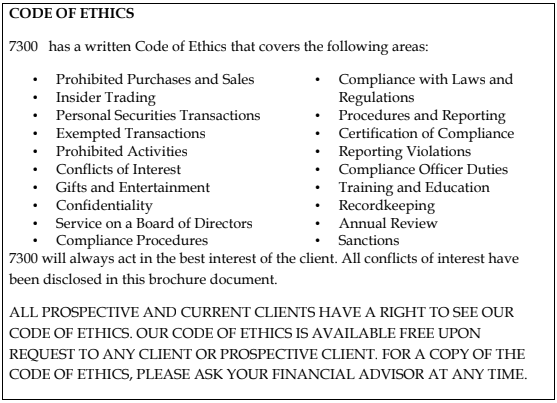
7300 does not recommend that clients buy or sell any security in which a related person to 7300 or 7300 has a material financial interest.
From time to time, representatives of 7300 may buy or sell securities for themselves that they also recommend to clients. This may provide an opportunity for representatives of 7300 to buy or sell the same securities before or after recommending the same securities to clients resulting in representatives profiting off the recommendations they provide to clients. Such transactions may create a conflict of interest. 7300 will always document any transactions that could be construed as conflicts of interest and will never engage in trading that operates to the client’s disadvantage when similar securities are being bought or sold.
From time to time, representatives of 7300 may buy or sell securities for themselves at or around the same time as clients. This may provide an opportunity for representatives of 7300 to buy or sell securities before or after recommending securities to clients resulting in representatives profiting off the recommendations they provide to clients. Such transactions may create a conflict of interest; however, 7300 will never engage in trading that operates to the client’s disadvantage when similar securities are being bought or sold.
Item 12: Brokerage Practices
Custodians/broker-dealers will be recommended based on 7300’s duty to seek “best execution,” which is the obligation to seek to execute securities transactions for a Client on terms that are the most favorable to the Client under the circumstances. The client will not necessarily pay the lowest commission or commission equivalent, and 7300 may also consider the market expertise and research access provided by the payment of commissions, including but not limited to access to written research, oral communication with analysts, admittance to research conferences and other resources provided by the brokers to aid in the research efforts of 7300. 7300 will never charge a premium or commission on transactions, beyond the actual cost imposed by the brokerdealer/custodian. 7300 recommends TD Ameritrade Institutional and Fidelity Brokerage Services as custodians. American Funds/Capital Group is used as a 401K custodian.
1. Research and Other Soft-Dollar Benefits
While 7300 has no formal soft dollars program in which soft dollars are used to pay for third party services, 7300 may receive research, products, or other services from its broker/dealer in connection with client securities transactions (“soft dollar benefits”) consistent with (and not outside of) the safe harbor contained in Section 28(e) of the Securities Exchange Act of 1934, as amended, and may consider these benefits in recommending brokers. There can be no assurance that any particular client will benefit from any particular soft dollar research or other benefits. 7300 benefits by not having to produce or pay for the research, products or services, and 7300 will have an incentive to recommend a broker dealer based on receiving research or services. Clients should be aware that 7300’s acceptance of soft dollar benefits may result in higher commissions charged to the client.
2. Brokerage for Client Referrals
7300 receives no referrals from a broker-dealer or third party in exchange for using that broker-dealer or third party.
3. Clients Directing Which Broker/Dealer/Custodian to Use
7300 will require clients to use a specific broker-dealer to execute transactions.
If 7300 buys or sells the same securities on behalf of more than one client, it might, but would be under no obligation to, aggregate or bunch, to the extent permitted by applicable law and regulations, the securities to be purchased or sold for multiple Clients in order to seek more favorable prices, lower brokerage commissions or more efficient execution. In such case, 7300 would place an aggregate order with the broker on behalf of all such clients in order to ensure fairness for all clients; provided, however, that trades would be reviewed periodically to ensure that accounts are not systematically disadvantaged by this policy. 7300 would determine the appropriate number of shares to place with brokers and will select the appropriate brokers consistent with the Adviser’s duty to seek best execution, except for those accounts with specific brokerage direction (if any).
Item 13: Reviews of Accounts
All client portfolio management accounts are reviewed at least monthly only by Christopher Joel Carroll, Founder and Portfolio Manager, with regard to clients’ respective investment policies and risk tolerance levels. All financial planning accounts are reviewed upon financial plan creation and plan delivery by Christopher Joel Carroll, Founder and Portfolio Manager. There is only one level of review for financial plans, and that is the total review conducted to create the financial plan.
Portfolio management reviews may be triggered by material market, economic or political events, or by changes in client’s financial situations (such as retirement, termination of employment, physical move, or inheritance). With respect to financial plans, 7300’s services will generally conclude upon delivery of the financial plan.
Each portfolio management client will receive at least monthly a written report that details the client’s account including assets held and asset value, which report will come from the custodian. Each financial planning client will receive the financial plan upon completion.
Item 14: Client Referrals and Other Compensation
7300 does not receive any economic benefit, directly or indirectly from any third party for advice rendered to 7300 clients.
7300 may, via written arrangement, retain third parties to act as solicitors for 7300’s investment management services. All compensation with respect to the foregoing will be fully disclosed to each client to the extent required by applicable law. 7300 will ensure each solicitor is properly registered in all appropriate jurisdictions.
Item 15: Custody
When it deducts fees directly from client accounts at a selected custodian, 7300 will be deemed to have limited custody of client’s assets and must have written authorization from the client to do so. Clients will receive all account statements and billing invoices that are required in each jurisdiction, and they should carefully review those statements for accuracy.
Item 16: Investment Discretion
7300 provides discretionary and non-discretionary investment advisory services to clients. The Investment Advisory Contract established with each client outlines the discretionary authority for trading. Where investment discretion has been granted, 7300 generally manages the client’s account and makes investment decisions without consultation with the client as to what securities to buy or sell, when the securities are to be bought or sold for the account, the total amount of the securities to be bought/sold, or the price per share. In some instances, 7300’s discretionary authority in making these determinations may be limited by conditions imposed by a client (in investment guidelines or objectives, or client instructions otherwise provided to 7300.
Item 17: Voting Client Securities (Proxy Voting)
7300 acknowledges its fiduciary obligation to vote proxies on behalf of those clients that have delegated to it, or for which it is deemed to have, proxy voting authority. 7300 will vote proxies on behalf of a client solely in the best interest of the relevant client. 7300 has established general guidelines for voting proxies. 7300 may also abstain from voting if, based on factors such as expense or difficulty of exercise, it determines that a client’s interests are better served by abstaining. Further, because proxy proposals and individual company facts and circumstances may vary, 7300 may vote in a manner that is contrary to the general guidelines if it believes that it would be in a client’s best interest to do so. If a proxy proposal presents a conflict of interest between 7300 and a client, then 7300 will disclose the conflict of interest to the client prior to the proxy vote and, if participating in the vote, will vote in accordance with the client’s wishes.
Clients may obtain a complete copy of the proxy voting policies and procedures by contacting 7300 in writing and requesting such information. Each client may also request, by contacting 7300 in writing, information concerning the manner in which proxy votes have been cast with respect to portfolio securities held by the relevant client during the prior annual period. Clients can send written requests to the Chief Compliance Officer at cjc@7300wealth.com
Item 18: Financial Information
7300 neither requires nor solicits prepayment of more than $500 in fees per client, six months or more in advance and therefore does not need to include a balance sheet with this brochure.
Neither 7300 nor its management has any financial condition that is likely to reasonably impair 7300’s ability to meet contractual commitments to clients.
7300 has not been the subject of a bankruptcy petition in the last ten years.
Item 19: Requirements For State Registered Advisers
7300 currently has only one management person/executive officer: Christopher Joel Carroll. Education and business background can be found on the Form ADV Part 2B brochure supplement for such individual.
Other business activities for each relevant individual can be found on the Form ADV Part 2B brochure supplement for each such individual.
7300 does not accept performance-based fees or other fees based on a share of capital gains on or capital appreciation of the assets of a client.
No management person at 7300 or 7300 has been found liable in an arbitration claim or been found liable in a civil, self-regulatory organization, or administrative proceeding that is material to the client’s evaluation of the firm or its management.
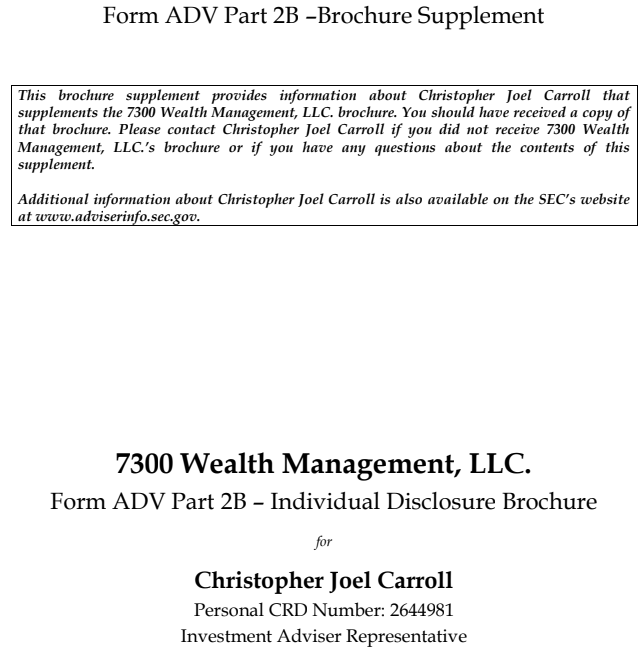
Item 2: Educational Background and Business Experience
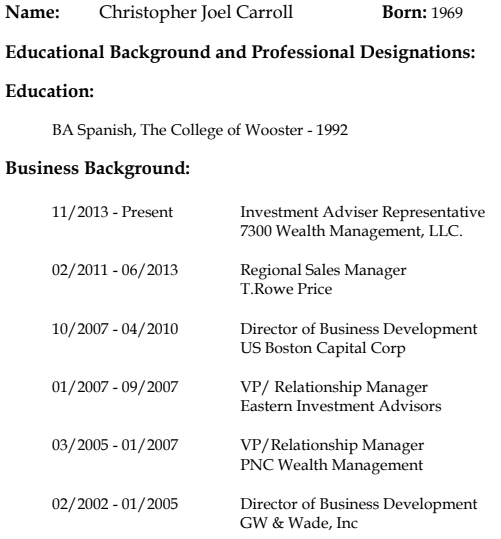
7300 Wealth Management, LLC.
7035 Campus Drive, Suite 901
Colorado Springs, CO 80920
(719) 358-6674
cjc@7300wealth.com
Item 3: Disciplinary Information
There are no legal or disciplinary events that are material to a client’s or prospective client’s evaluation of this advisory business.
Item 4: Other Business Activities
Christopher Joel Carroll is not engaged in any investment-related business or occupation (other than this advisory firm)
Item 5: Additional Compensation
Other than salary, annual bonuses, or regular bonuses, Christopher Joel Carroll does not receive any economic benefit from any person, company, or organization, in exchange for providing clients advisory services through 7300 Wealth Management, LLC..
Item 6: Supervision
As the only owner and representative of 7300 Wealth Management, LLC., Christopher Joel Carroll supervises all activities of the firm. Christopher Joel Carroll’s response information is on the cover page of this disclosure document.
Item 7: Requirements For State Registered Advisers
This disclosure is required by Colorado securities authorities and is provided for your use in evaluating this investment advisor representative’s suitability.
A. Christopher Carroll has NOT been involved in any of the events listed below.
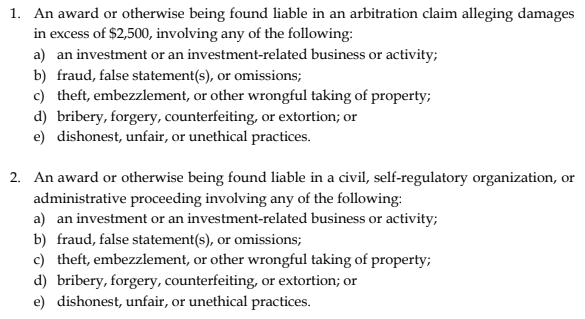
B. Christopher Carroll has NOT been the subject of a bankruptcy petition in the past ten years.

